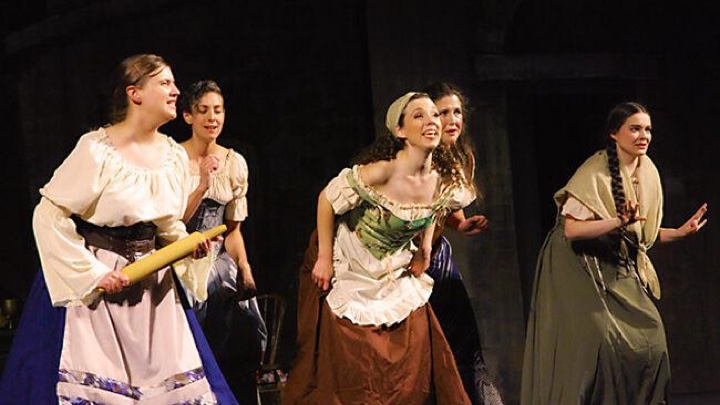

Striking among the latter is the Smith Opera House, built in 1894 by local orchard-owning magnates, and maintained with the help of some of the numerous local wineries. (Tasting tours available.)
Therefore, it is appropriate this year that the venerable Geneva Light Opera is giving three performances this weekend of an opera about magical brews of fell purpose, Gaetano Donizetti’s L’Elisir d’amore (The Elixir of Love). This review is based on the dress rehearsal on Tuesday evening.
The popularity of this opera, which has been holding audiences since 1832, lies not merely in its melodious stream of waltzes, comic patter and lively choruses, nor in Dr. Dulcamara, the fast-talking quack, who will prescribe for anything that ails you (or doesn’t), nor in Nemorino, the village simpleton in love with the impervious flirt, Adina – no, the secret of the opera’s enduring success lies in the intrusion of sentiment into farce.
In Act II, in the midst of the plot’s farcical coincidences and shenanigans, Nemorino expresses genuine emotion in his aria, “Una furtiva lagrima.” Seeing that his flirtations, which never interested her before, have brought a single furtive tear to the eye of his beloved Adina, Nemorino is crushed: he would give anything to console her tears.
Donizetti had discovered one of the great secrets of comedy: For farce to have dimension, it must reveal genuine pain. Suddenly Nemorino isn’t just a fool – he has a heart. He reaches out to Adina, and we want him to have her. We want them both to get what they want, and are touched when they do. We go home feeling good. The melodies help. Even Dr. Dulcamara sells an extra round of snake oil.
“Una furtiva lagrima” is a lovely tune, the delight of the bassoonist, who seldom ever gets a chance to play anything romantic. And a lyric tenor gets to demonstrate a range of skills, vocal and dramatic. The likes of Caruso, Bergonzi, Gedda and Pavarotti made sure L’elisir survived.
The Geneva Light Opera production is set in a fairytale Italian village, its peasants kitted out with farm implements, vegetables, wine, and more wine. Recitatives in English guide us through numbers sung in the original Italian. The acting is in character, and the company has sent in the clowns – a wise decision in a farce.
Michael Anderson, who seldom misses a chance to take a pratfall or wield a comic hoe, plays the lovesick Nemorino. His singing is thin to begin with, but builds strength steadily, always true to the melodic line. The small size of his tenor might not be apparent in other company.
But his Adina, Sarah Joyce Cooper, is something else again, her voice sizable and beautifully produced, the high notes never shrill, the low ones full-bodied, the occasional trill limpid and unforced. She sings with a passionate power that should soon lead her to the roles of Verdi. Moreover, she is a pretty woman and a charming actress.
Bass Valerian Ruminski plays duplicitous Dr. Dulcamara, with verbal dexterity and the pompous self-confidence suitable to any flim-flam man. Ruminski’s dark, smooth sound always gives pleasure, and combines well in his duets with soprano and tenor.
Brian Keith Johnson sings Adina’s other suitor, the preening Sergeant Belcore, amorously devoted to the ladies and to himself, not necessarily in that order. Johnson is definitely more character baritone than lyric voice, but his posturing antics were what this opera calls for.
Eric Mahl conducts the sparkling score in a stripped-down but cleverly rearranged orchestra, and the staging by Steve Vaughan keeps the chorus twirling dance steps in the background while the simple story unfolds clearly around and in front of them.

























Comments